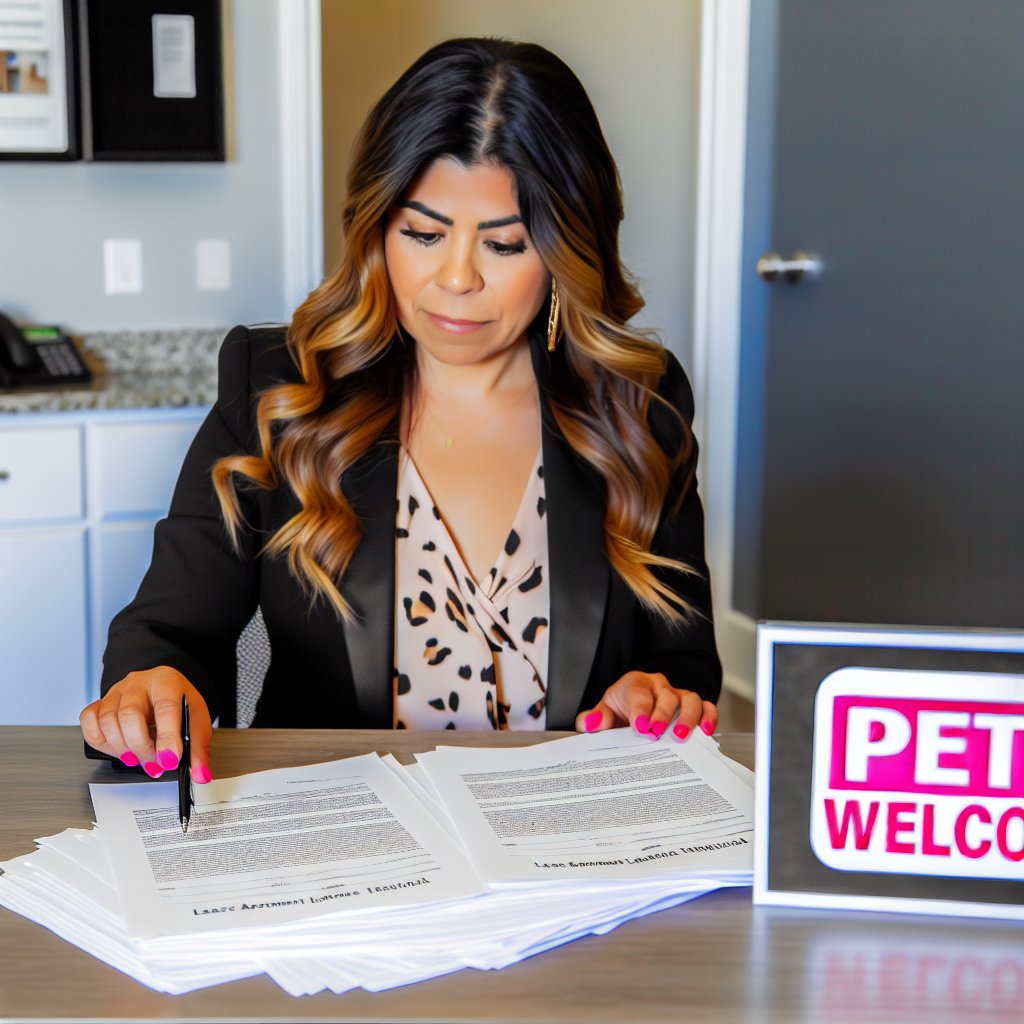Overview of Lease Agreements in Pet-Friendly Rentals
Lease agreements for pet-friendly rentals are essential documents for both landlords and tenants.
They outline the terms and conditions of living with pets in rental properties.
Landlords often have specific requirements regarding the type and size of pets allowed.
This ensures that the property remains well-maintained and secure.
Importance of Lease Agreements
Lease agreements create clear expectations for both parties.
They protect the rights of tenants while also safeguarding the interests of landlords.
Additionally, they help to prevent misunderstandings about pet ownership.
Consequently, both sides can enjoy a harmonious living situation.
Key Components of Pet-Friendly Lease Agreements
Pet-friendly lease agreements generally include several critical components.
- Details about the types and sizes of permitted pets.
- Any additional pet deposits or fees required by the landlord.
- Clause addressing pet behavior and liability for damages.
- Information about pet insurance, if required.
These components help set clear guidelines for responsible pet ownership during the lease period.
Responsibilities of Tenants
Tenants have specific responsibilities when they sign a pet-friendly lease.
They must ensure their pets do not disrupt the peace of other residents.
Additionally, tenants are responsible for cleaning up after their pets.
Furthermore, they should comply with any breed restrictions specified in the lease.
Landlord Considerations
Landlords should carefully consider their policies regarding pets.
Transform Your Real Estate Decisions
Unlock personalized real estate insights crafted just for you. Get actionable advice designed to amplify your success.
Get StartedThey need to assess the potential risks and benefits of allowing pets in their properties.
Moreover, regular inspections may be necessary to ensure pet-related compliance.
Additionally, having a clear pet policy can attract a larger pool of potential tenants.
The Importance of Pet Policies in Lease Agreements
Protecting Landlords’ Interests
Pet policies safeguard landlords from potential property damage.
They help establish clear expectations regarding pet behavior.
Additionally, policies can limit the number of pets in a rental unit.
Such measures reduce liability risks associated with pet-related incidents.
Enhancing Tenant Satisfaction
Clear pet policies can attract responsible pet owners as tenants.
Allowing pets can significantly increase tenant retention rates.
Moreover, pet-friendly policies often lead to better landlord-tenant relationships.
Setting Ground Rules
Policies should clearly define acceptable pet types and breeds.
Landlords must communicate rules about pet care and supervision.
Furthermore, policies should outline noise restrictions related to pets.
Establishing Financial Responsibility
Lease agreements can include pet deposits or pet rent options.
Showcase Your Real Estate Business
Publish your company profile on our blog for just $200. Gain instant exposure and connect with a dedicated audience of real estate professionals and enthusiasts.
Publish Your ProfileThese financial measures protect landlords from potential damages.
Moreover, they help ensure tenants are invested in their responsibilities.
Types of Pets Covered in Lease Agreements
Common Household Pets
Landlords typically allow common pets in their lease agreements.
Dogs and cats rank among the most popular choices.
Pet owners should confirm breed restrictions with their landlords.
Size limitations may also apply, especially for dogs.
Exotic Pets
Some landlords permit exotic pets in their properties.
This category includes birds, reptiles, and small mammals.
Potential pet owners must ensure their landlord allows these types.
It’s wise to provide detailed information about the pet’s care needs.
Service and Emotional Support Animals
Landlords must accommodate service animals under the law.
Emotional support animals also may have specific protections.
Documentation from a mental health professional can aid requests.
Communicating openly with landlords improves the approval process.
Fish and Small Animals
Lease agreements often cover fish and small caged animals.
Common options include hamsters, guinea pigs, and rabbits.
Landlords might impose limits on the number of animals.
Ensuring the proper care and cleanliness is essential.
Discover More: Property Insurance Laws and Liability Risk Management
Lease Agreements for Pet-Friendly Rentals
Standard Lease Terms
A lease agreement outlines the responsibilities of both tenant and landlord.
It typically covers rent payment, security deposits, and lease duration.
These standard terms apply regardless of pet policies.
However, landlords may add additional clauses for pet owners.
Pet-Specific Clauses
Pet-specific clauses detail the rules for having pets on the property.
These clauses ensure a clear understanding of pet-related responsibilities.
Common elements in pet clauses include breed restrictions and behavior standards.
Breed Restrictions
Landlords may specify which dog breeds are permitted.
This measure aims to minimize risks associated with certain breeds.
Additionally, landlords can require proof of pet registration.
Behavior Expectations
Another important aspect is the behavioral expectations for pets.
Showcase Your Real Estate Business
Publish your company profile on our blog for just $200. Gain instant exposure and connect with a dedicated audience of real estate professionals and enthusiasts.
Publish Your ProfileTenants must ensure their pets do not disturb neighbors.
This includes noise control and nuisance prevention.
Fees and Deposits
Pet-related fees usually cover extra cleaning and potential damages.
Landlords might charge a non-refundable pet deposit.
This deposit contributes to the property’s maintenance costs.
Insurance Requirements
Some landlords may require renters insurance for pet owners.
This policy protects against potential liability claims.
Ensuring proper coverage provides peace of mind for both parties.
Pet Care Responsibilities
Lease agreements often highlight pet care responsibilities.
Tenants must clean up after their pets and manage waste disposal.
They are also responsible for ensuring pets receive proper care.
Warning and Eviction Policies
Landlords should outline the policy for dealing with pet-related violations.
Typical policies include verbal warnings followed by written notices.
Persistent violations may lead to eviction proceedings.
Discover More: Legal Rules for Handling Tenant Complaints and Disputes
Deposit and Fee Structures for Pet Owners
Understanding Security Deposits
Security deposits play a crucial role in pet-friendly rentals.
Landlords often require a larger deposit for tenants with pets.
This helps cover potential damages caused by animals.
Typically, the security deposit is refundable at the lease’s end.
However, certain conditions may affect this refund.
Tenants should discuss deposit terms before signing the lease.
Pet Fees Explained
In addition to security deposits, landlords may charge pet fees.
These fees are often non-refundable and cover extra cleaning costs.
Landlords might set a monthly pet rent as well.
This fee can vary based on the type or size of the pet.
Reviewing all fees beforehand ensures transparency.
Negotiating Terms Related to Pets
Negotiation can be beneficial for pet owners.
Discussing deposit amounts can lead to better terms.
Some landlords may be open to lowering fees upon request.
Highlighting your responsible pet ownership can also help.
Showcase Your Real Estate Business
Publish your company profile on our blog for just $200. Gain instant exposure and connect with a dedicated audience of real estate professionals and enthusiasts.
Publish Your ProfileProviding references from previous landlords enhances your case.
State Regulations on Pet Deposits and Fees
Each state has different rules regarding pet deposits.
Some states limit the amount that can be charged.
Tenants should familiarize themselves with local laws.
Understanding these regulations can prevent disputes.
Staying informed ensures compliance during the leasing process.
Explore Further: Navigating Rent Control Laws and Tenant Eviction Policies

Responsibilities of Pet Owners in Rental Agreements
Maintaining a Safe Environment
Pet owners must ensure their pets pose no threat to others.
Regular checks for safety hazards are essential.
Additionally, owners should remove any potential dangers from common areas.
Cleaning Up After Pets
Pet owners have a duty to clean up pet waste promptly.
Leaving waste can result in health hazards and unpleasant odors.
Therefore, always carry waste disposal bags when walking pets.
Respecting Property and Neighbors
Pets should not damage the rental property in any way.
Pet owners must prevent their pets from scratching or chewing surfaces.
Moreover, keeping noise levels reasonable respects neighbors’ peace.
Communicating Any Issues
Pet owners should inform landlords of any pet-related issues immediately.
Transparency helps maintain a good relationship with property owners.
It also aids in resolving problems quickly and efficiently.
Providing Documentation
Many rental agreements require pet owner verification.
Documentation may include vaccination records and licenses.
Additionally, providing proof of pet insurance may be beneficial.
Adhering to Breed and Size Restrictions
Landlords may impose breed and size restrictions in agreements.
Pet owners must adhere to these limits for compliance.
Moreover, ensuring that pets fit within these guidelines reduces conflicts.
Uncover the Details: Security Deposit Laws and Refund Guidelines for Landlords
Rights of Landlords Regarding Pets in Rental Properties
Understanding Pet Policies
Landlords have the right to set pet policies in their properties.
These policies may include restrictions on pet types and sizes.
Additionally, landlords can require pet deposits or fees.
Clear communication of these policies helps avoid future disputes.
Showcase Your Real Estate Business
Publish your company profile on our blog for just $200. Gain instant exposure and connect with a dedicated audience of real estate professionals and enthusiasts.
Publish Your ProfileDocumenting Pet Agreements
Landlords should document any pet agreements formally.
This includes specifying allowed pets in the lease agreement.
Furthermore, written agreements clarify pet-related responsibilities.
Proper documentation aids in enforcing the pet policies.
Screening Potential Tenants
Landlords can screen potential tenants based on pet ownership.
They may ask for references related to previous pet ownership.
Also, landlords can inquire about pet behavior and training.
This process helps ensure tenants are responsible pet owners.
Limitations on Pet Policies
While landlords have rights, they must follow fair housing laws.
Some laws may prohibit discrimination against service animals.
Moreover, landlords must ensure their policies comply with local regulations.
Consulting legal guidance can clarify these obligations.
Enforcing Pet Rules
When tenants violate pet policies, landlords have enforcement options.
This may include issuing warnings or requesting corrective action.
Landlords can also deduct pet damages from security deposits.
Consistent enforcement ensures fairness for all tenants.
Legal Considerations and Local Regulations for Pet-Friendly Rentals
Understanding Pet Policies
Landlords should clearly define pet policies in lease agreements.
These policies determine what type of pets are allowed.
Furthermore, they specify breed restrictions and size limits.
It’s essential to include details about pet deposits and fees.
This clarity helps prevent misunderstandings between landlords and tenants.
Local Laws and Regulations
Check local laws related to pet ownership in rentals.
Some areas may have specific regulations on pet types.
Additionally, zoning laws can affect pet policies.
Always ensure compliance with state and municipal laws.
Ignorance of these laws can lead to legal disputes.
Service Animals and Emotional Support Animals
Recognize the difference between pets and service animals.
Under the ADA, service animals have specific rights.
Landlords cannot discriminate against tenants with service animals.
Emotional support animals, however, may have different rules.
Showcase Your Real Estate Business
Publish your company profile on our blog for just $200. Gain instant exposure and connect with a dedicated audience of real estate professionals and enthusiasts.
Publish Your ProfileCheck local regulations to clarify these distinctions.
Insurance Considerations
Landlords should assess the implications of pets on insurance policies.
Some insurers may require specific coverage for pet-related incidents.
Before drafting lease agreements, review your insurance policy.
This step minimizes potential risks and liabilities.
Enforcement of Pet Policies
Clearly state consequences for violations of pet policies.
This may include fees, eviction notices, or termination of the lease.
Establish a process for addressing complaints effectively.
Both landlords and tenants benefit from clear communication.
Documentation of any issues is crucial for legal protection.
Additional Resources
Navigating Pet Policies for Rental Properties in the Twin Cities




